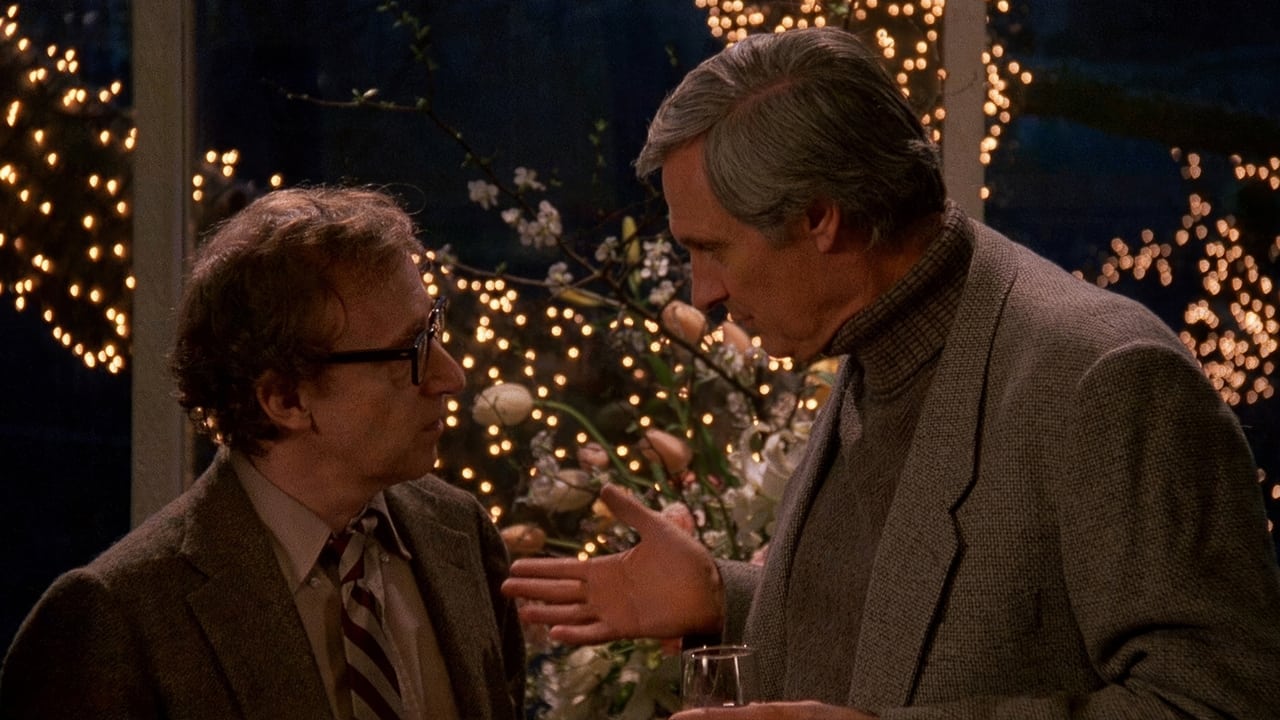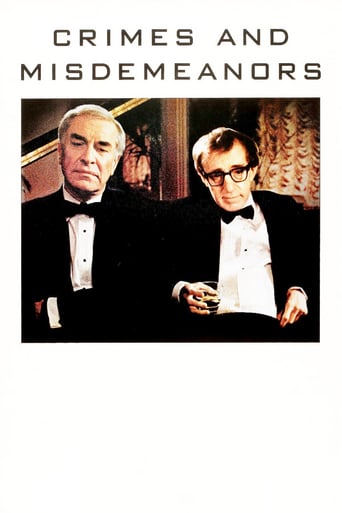

I think it's boring, it has no rhythm, it's not interesting. I have seen his film many times. But suddenly it takes us on a new path that is not the case and everything to finish as always. The film is repeated and repeated, we change course, start another movie and end in cross lives.Spoiler: Personally, I do not like anything Woody Allen, sorry, I apologize to everyone in the movies and this movie is not going to be different. I've never seen anything in his movies. Well yes, it makes dialogues better than anyone. I think he was born knowing to do dialogues, but the rest, neither know how to do nor care. I already say the director of photography of the film, Sven Nykvist, in an interview, does not spend time to the camera or the photo and so it comes out. One of his favorite directors is Ingmar Bergman but at least this one if he dedicated time to these sections.At least as happens in real life, the arrogant takes the girl. It's the only thing that has seemed logical and real in the movie. Cynicism on all sides, but selling it as a logical thing.I think that if he had dedicated himself to writing and someone else would have shot the movies he would have won a lot. All you have of genius of the paper, it has of not knowing to direct.
... View MoreImagine if everything you were ever taught about moral, ethics and karma turns out not to be true? « You get what you give », « Good things come to good people », « Instant karma is gonna get you! ». We hear and often repeat these phrases, try to live well with ourselves and with others, be good citizens, do good. Many of us believe that this is not only the good way to go about life, but also expect to be rewarded because of our good behavior, to get what we want, to grow in life, have a great job, meet a nice partner, live well, prosper.This is, however, a Woody Allen story, and it may as well be his masterpiece. The story can be roughly divided in two, and centers on the lives of two very different men. One is Judah Rosenthal (Martin Landau), a married and successful ophthalmologist who suddenly starts facing problems with his lover (in a good performance by Anjelica Huston). The other man is the idealist and broke moviemaker Cliff Stern (played by Allen himself), facing family problems, a broken marriage and a work crisis. The stark difference between these two men turn the movie into a would-be duel between idealism and superficiality.Themes like our roles in society, religion, morals, existentialism, the final judgment and philosophy are thoroughly discussed in the movie, both directly in conversation but also reflectively through the actions of the different characters, without ever compromising the development of the story, nor the viewer's interest in it. Balanced in the comic paranoia of Allen's writing and acting, the story finds a meeting point between drama, irreverence and meaningful topics. Pertinent reflections and dialogues drive characters to often funny, often heavy situations, and many times both.« Crimes and Misdemeanors » represented a return of Woody Allen to comedy, after flirting with more psychologically driven stories, clearly influenced by Ingmar Bergman, as shown in previous works like « Another Woman » and « September ». Still, comedy here exists and at the same time does not, as the deeper reflections proposed by the movie can push the viewer into a different direction.Rosenthal's tale shows a man initially consumed by anguish over the decisions he needs to take. Whatever path he chooses will certainly leave a long-lasting and deep scar in his life. Humor is absent here, and Sven Nyqvist's cinematography (the same that often worked with Bergman) is dark and somber, reflecting the state of mind of the central character. Cliff's journey, however, is lighter and more comical, a typical portrait of Allen's characters played by himself. The different stories balance each other out perfectly: they offer the light after the darkness, the calm after the storm.Finally, and only towards the end of the movie, the two men meet and talk about the crimes and sins of real life, and what can their real consequences be. The encounter of these two seemingly so different characters, but who then suddenly realize that perhaps what they were always taught about life and morals could be wrong, could be considered an anagnorisis of Aristotle, a final realization, a critical discovery of things as they show themselves to be, not as we had constructed them in our imaginary. Are we indeed the sum of our choices?
... View MoreI won't discuss the plot of this film much. It has been detailed thoroughly on this site. Perhaps too much.Woody Allen has assembled a great cast for "Crimes and Misdemeanors". He shot the film then, reportedly, trashed one third of it, rewrote and reshot that third. The result is an interesting film. Like all Allen products, a film of ideas.Allen likes to tackles cosmic questions, philosophical conundrums, the absurdities of conventional wisdom. Here he intertwines these meditations with the mundane--one of his greatest talents.Faced with disheartening circumstances or life-shattering decisions, Allen's characters behave like humans. Allen plays Clifford Stern, a documentary film maker in an unhappy marriage. But he does not seem extremely unhappy. He finds humor in the universe and happiness in the things he loves.Through all the real-world machinations of its plot, this film keeps returning to the universal view, looking for absolute answers to the eternal questions. In this film, Allen tells us that humor helps us survive the stark realities of existence. And that love gives (us) meaning to an indifferent universe. On the other hand, his search for a universal definition of justice goes unresolved--a tricky concept that few agree on.
... View MoreAnother Woody Allen delight, a diptych of two moral conundrums, Laudau, a well-off ophthalmologist who ultimately gets away with the murder of his badgering mistress (Huston), meanwhile a frustrated documentary filmmaker (Allen) flunks to win his love interest (Farrow) over a pretentious showbiz magnate (Alda).For Laudau's story, one can easily sniff out the comparability of Allen's later London-based MATCH POINT (2005, 7/10), the other women are merely dispensable in favor of wealth, social status and ostensibly stable matrimony. In this film, its main concern is the struggle within, the general moral conscience Vs. the guilt or the sin, and out of left field, it is the latter eventually prevails, with the trappings of a comfortable life, the murder becomes a petty snippet in his memory and time can put everything back into an equilibrium, it is beyond any religion's absolution. Landau delivers one of his best performances in his lengthy career, an outright leading role (again, shamefully the category fraud push him into supporting group in the Oscar race), a hypocrite sleekly justifies his selfish and heinous behaviors with superfluous paddings, a despicable person so full of life with mocking caricature and a tint of self-reflection, everyone has his or her own unsurmountable hurdle in reality, luckily the preponderance is able to rein the yardstick. Anjelica Huston breaks her lofty stereotype, to overplay an unreasonable mistress who is too desperate to shore up her wanting sense of security, as vexing and halfwitted as she is, her denouement is too much a punishment. As for Allen's romantic entwinement with Farrow and his doomed marriage, it brims with casual wisecracks and addicted cinema-goings, but the scene-stealer is Alda, whose character is blatantly based on the late writer Larry Gelbart, utters bon mots like, comedy is tragedy plus time; or if it bends, it's funny, if it breaks, it isn't. He is snobbish and lewd to everyone's eyes, yet he walks off with Allen's soul mate. Woody Allen is rehashing the same old self, and Mia Farrow refrains herself as an out-of-his-league dame, who speaks highly about her unrealized ambition in order to reject a man trapped in a dead wedlock, yet subservient to the mogul's courtship, it all boils down to the point of a woman's self-deceptive blindness towards material needs, with a collateral damage to her unsuccessful suitor. So in both stories, the female characters are less glamorous and adorable here, not to mention Allen's sister's icky sex encounter in the bedroom. The film is mostly brisk under the accompany of a jazzy score, and its debate on moral structure is a cogent one and could be a reference to all the contemporary marital or relationship mishaps, even the religious mumble-jumble has an epiphany on those non-believers.
... View More